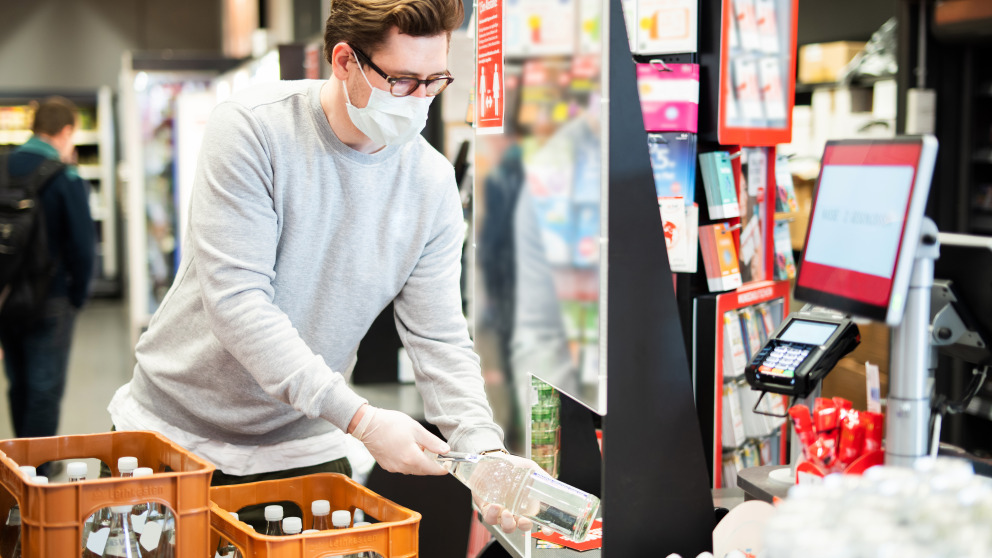The mask in the Coronavirus crisis: a symbol of risk perception, politeness and community spirit
05.05.2020

Alongside the increase in the number of Coronavirus-infected people, perhaps the biggest change in Germany in the last few weeks has been the change in the perception of the risk of the virus. A good symbol for this ongoing transformation is the mask. The assessment of its benefit has developed very dynamically, not only in the medical field but also among politicians and citizens. A small piece of cloth therefore represents something bigger, which will raise interesting questions for future research in various fields, such as medicine, law and social sciences.
It has been interesting for me to have also personally observed the development of risk perception in Germany, and along with it, the change in attitude towards the mask in public spaces in Germany. A colleague of mine who comes from Hong Kong was already wearing a mask in February, while attending the German language evening classes we are both enrolled in. Our teacher, who comes from Austria, found her cautious behaviour in February surprising and fascinating. But when we resumed the course at the end of March after a long break, he said to her: "You were right all along!"
The effectiveness of the masks against the virus and the mask requirement
The Robert Koch Institute recommended for a considerably long period of time that only people with a respiratory disease should wear a mask. In April it changed its assessment to say that a simple mask could, in fact, reduce the risk of infection. Interestingly, as recently as March, the German Health Minister, Jens Spahn considered the wearing of simple masks to be unnecessary. However, after Easter, German Chancellor Angela Merkel "urgently" recommended that everyday masks be worn in public transport and in retail stores. By the end of April, the obligation to wear masks was enforced in all German states.
The mask requirement, justice and personal freedom
The ‘Kontaktverbot’ measures put in place in Germany to reduce social contact during the pandemic naturally entail a curtailment of personal freedom. Because these regulations were introduced at the beginning of spring, they seemed even more arduous, for they required people to restrict their outdoor movements at a time of improving weather. Within a short time, however, we have seen Germans trading some of their personal freedoms for greater caution towards the pandemic.
On the one hand, we heard about irresponsible "Corona parties" in Berlin in mid-March, and on the other hand, at the end of April, 60 percent of Berliners agreed to compulsory masks when shopping - at a time when the Senate was still undecided on this issue.
The interplay between the incremental developments in the decision-making process to make the wearing of masks compulsory and the simultaneously increasing number of voluntary mask-wearers could certainly be an interesting topic for the study of the interplay of law and behaviour in the 21st century. It could also offer interesting food for thought for the legislative process in other fields of law.
In my view, our social engagement with the pandemic will be based, in one form or another, on a trade-off between personal freedoms and caution in the interest of health, until a vaccine is available. This compromise can take various forms: for example, collecting personal data from Coronavirus tracking apps, refraining from sport and outdoor activities, reducing social contacts, or wearing masks. Given the other options, wearing a mask ultimately appears to be one of the smallest sacrifices, and is therefore among the easiest to accept. Apart from health considerations, this is perhaps one reason why so many have voluntarily accepted the wearing of the mask.
The masks in society
Before the Coronavirus crisis, wearing masks was considered culturally alien in Germany and associated with Asia. Despite this foreignness, the current acceptance of masks in Germany has been achieved quite rapidly.
An important point to consider is the property of masks to protect others from possible infection. Christian Drosten, one of Germany's leading virologists, calls wearing a mask a "gesture of politeness", with which any person can show the intention to protect others from a possible infection, even though no visible symptoms of the virus may have appeared.
The expansion in the scale of mask-wearing also enables people to deal with the challenges of the crisis in a meaningful way on a personal level. We can now observe several examples all over Germany of people who voluntarily sew masks for others, with the intention of helping the community, often for free. On the other hand, this situation is also an opportunity to support people who are currently unemployed due to the economic fallouts of the Coronavirus, and who can earn money by selling masks.
All in all, the masks reflect qualities like responsibility, considerateness, and the solidarity of the community during one of the greatest crises of our lives so far.
